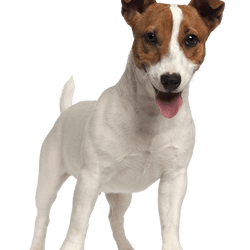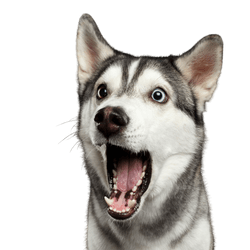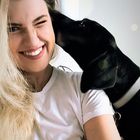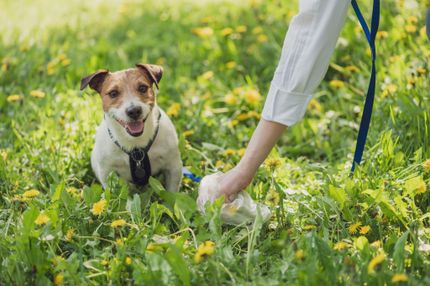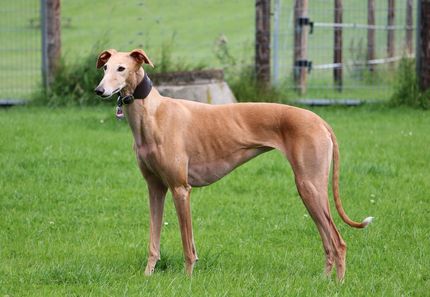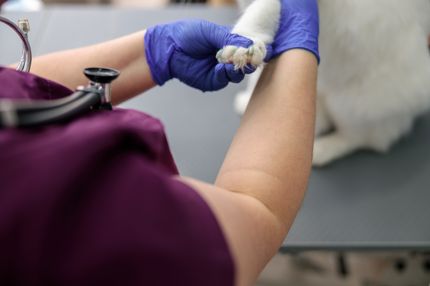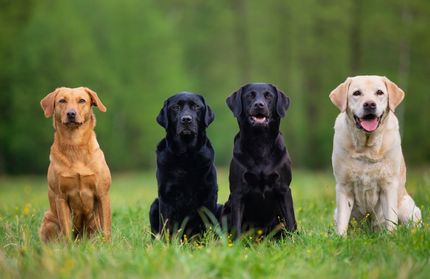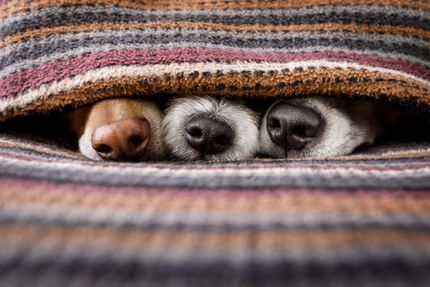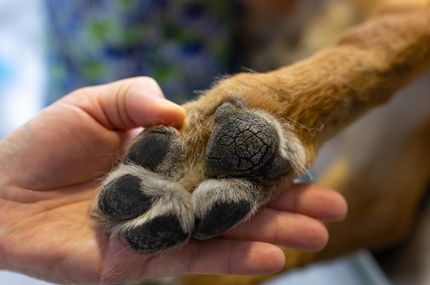Facts & Origin
The Husky Jack - An exciting mix of the Siberian Husky and the Jack Russell Terrier.
The Husky Jack is a fascinating mix of the Siberian Husky and the Jack Russell Terrier. The combination of these two breeds creates a unique dog with interesting characteristics of both parent dogs.
The Siberian Hus ky is an ancient breed, originally bred in Siberia as a sled dog. With its impressive stamina and friendly nature, the Siberian Husky has made a name for itself worldwide.
The Jack Russell Terrier , on the other hand, originated in England and was originally bred for hunting. He is known for his lively personality, courageous nature and intelligence.
The exact origin of the Husky Jack is not always accurately documented, as it is a mixed breed dog. Nevertheless, this breed is enjoying a growing popularity due to its unique characteristics and charming appearance.
Suitability and attitude
With its blend of stamina, intelligence and lively nature, it is an ideal companion for active people who enjoy spending time outdoors. His ability to learn new things quickly makes him a versatile dog that enjoys taking on challenges.
| Alternate Name | - |
| Origin | England - USA |
| Life expectancy | 12 - 16 years |
| Care requirements | low-maintenance - high-maintenance |
| Activity level | high |
| FCI group | not recognised |
| AKC group | not recognised |
| KC group | not recognised |
More Jack Russell Terrier mixes
More Siberian Husky mixes
Attitude, character and temperament of the breed
Possible character traits of the Husky Jack
The Husky Jack is an exciting dog with a mix of traits that make him an interesting companion. He inherits the lively nature of the Jack Russell Terrier and the endurance of the Siberian Husky. This combination makes him an energetic dog that needs both physical and mental challenges.
The Husky Jack is intelligent and eager to learn, which makes him an excellent candidate for various activities such as obedience training, agility or even dog sports. He is a good companion for active people who enjoy spending time outdoors and have fun training and playing with their dog.
Thanks to his terrier heritage, the Husky Jack may also have some inherent hunter instincts . It is important to socialize him early and give him proper training to minimize undesirable behavior.
Character
Usage
Care and health maintenance
The Husky Jack usually has a medium length coat that requires regular grooming to keep it healthy and well groomed.
The Husky Jack's dense coat should be brushed regularly to remove loose hair and prevent matting. More intensive brushing is required, especially during coat changes, to maintain the coat's appearance. Bathing should only be done when necessary to avoid stripping the skin's natural oils too much. Use a mild dog shampoo and rinse thoroughly to avoid skin irritation.
Check your Husky Jack's claws regularly and trim them as needed. Be careful not to cut them too short to avoid injury. Also, check your dog's ears regularly and clean them as needed to prevent ear infections from forming.
Typical breed diseases of the Husky Jack
To ensure the health of your Husky Jack, regular veterinary checkups are important. However, there are some specific health issues you should pay special attention to:
Siberian Huskies are prone to eye diseases such as cataracts or retinal problems. Regular eye exams with your veterinarian can help detect problems early.
Both Siberian Huskies and Jack Russell Terriers can be prone to joint problems such as hip dysplasia or patellar luxation. Watch for signs of lameness or stiffness and ensure adequate exercise and proper joint support.
Since Jack Russell Terriers tend to become overweight , it is important to monitor your Husky Jack's weight and ensure a balanced diet and adequate exercise.
Appearance of the Husky Jack
The Husky Jack can vary in appearance and characteristics. Since it is a mixed breed, the external appearance can vary from dog to dog. Nevertheless, there are some general characteristics that are typical of the Husky Jack.
It is important to note that the appearance of each Husky Jack can be individual and depends on the parent breeds. If you have a Husky Jack or are interested in this mixed breed, it is advisable to consult with a reputable breeder or veterinarian to get specific information about your own dog's appearance and characteristics.
The physique
The Husky Jack is usually medium in size, although the exact size depends on the size of the parent breeds. They can be around 30 to 45 centimeters tall and weigh from 7 to 18 kilograms.
This dog usually has a muscular and athletic build. They often have a slender build with well-developed muscles. The physique can vary depending on the ratio of the parent breeds.
The Husky Jack's coat can vary and be inherited from the parent breeds. It can be short and smooth as in the Jack Russell Terrier or denser and medium length as in the Siberian Husky. The coat color can also vary and ranges from white, black, brown to different blends and patterns.
The head
The Husky Jack's head can have characteristics of both parent breeds. They often have a more wedge-shaped head with almond-shaped eyes. The ears may be erect or slightly tilted forward. The Husky Jack's eyes can be different colors, including blue, brown, amber, or a combination of both. This characteristic is often inherited from the Siberian Husky side.
| Fur length | short - medium |
| Fur | rough-haired - flat coated |
| Ear shape | Tilt-ear - Standing Ears |
| Tail | lang - fanned out |
| Anatomy | sporty, rugged, strong, sporty |
| Size ♀ | 25 - 56 cm |
| Weight ♀ | 6 - 23 kg |
| Size ♂ | 25 - 60 cm |
| Weight ♂ | 6 - 27 kg |
| Suitable For | - |
Known Diseases
Cataract
Cataracts are still one of the most common causes of blindness, even in dogs.
Numbness
Often occurs in old age.
Ataxia
Ataxia (from Greek ἀταξία ataxia 'disorder' 'irregularity') is a generic term in medicine for various disorders of movement coordination. Ataxia can occur even when there is no paralysis (paresis), that is, when there is normal muscle strength.
Atopy
Canine atopic dermatitis or environmental allergy is characterized by itching with scratching, biting, and rubbing of the face, paws, and belly
Dermatophytosis
Dermatophytosis (synonym dermatophytosis, from ancient Greek τὸ δέρμα derma, German 'skin' and ancient Greek φυτόν phyton, German 'plant') or tinea (Latin for 'woodworm', 'moth') is a skin fungal disease caused by specific fungi (dermatophytes).
extreme whiteness
May be associated with some other diseases.
Legg-Calve-Perthes
Legg-Calvé-Perthes disease (aseptic femoral head necrosis) is a growth disorder of the femoral head.
Dislocations
Lenticular and patella luxation occur in some breeds and affect the eye.
Myelopathy
Degenerative myelopathies of dogs are a series of slowly progressing neurological diseases associated with destruction of the spinal cord. These diseases are associated with slowly progressive movement disorders of the hindquarters.
Hip dysplasia (HD)
Hip dysplasia (HD) is a genetic condition in dogs where the hip joint is not shaped properly. This leads to pain, stiffness and restricted movement.
Eye diseases
Often occur with allergies and intolerances.
Skin inflammations
Can be hereditary in certain breeds.
FAQ
-
The size range varies depending on the parent, but usually they will be between 28 cm and 41 cm.
-
They need a balanced diet that includes both animal and plant protein, fiber and carbohydrates.
-
They are very intelligent and active, but also gentle and loving. They like to connect with other people and animals.
-
This breed can be prone to respiratory problems, vision problems and allergic reactions. To prevent possible health problems, it is important to make regular vet visits and keep an eye on the dog's overall health.
-
Your coat needs regular care, about 1-2 times a week, especially during the shedding season. An occasional brushing will help remove impurities and keep your dog clean.
